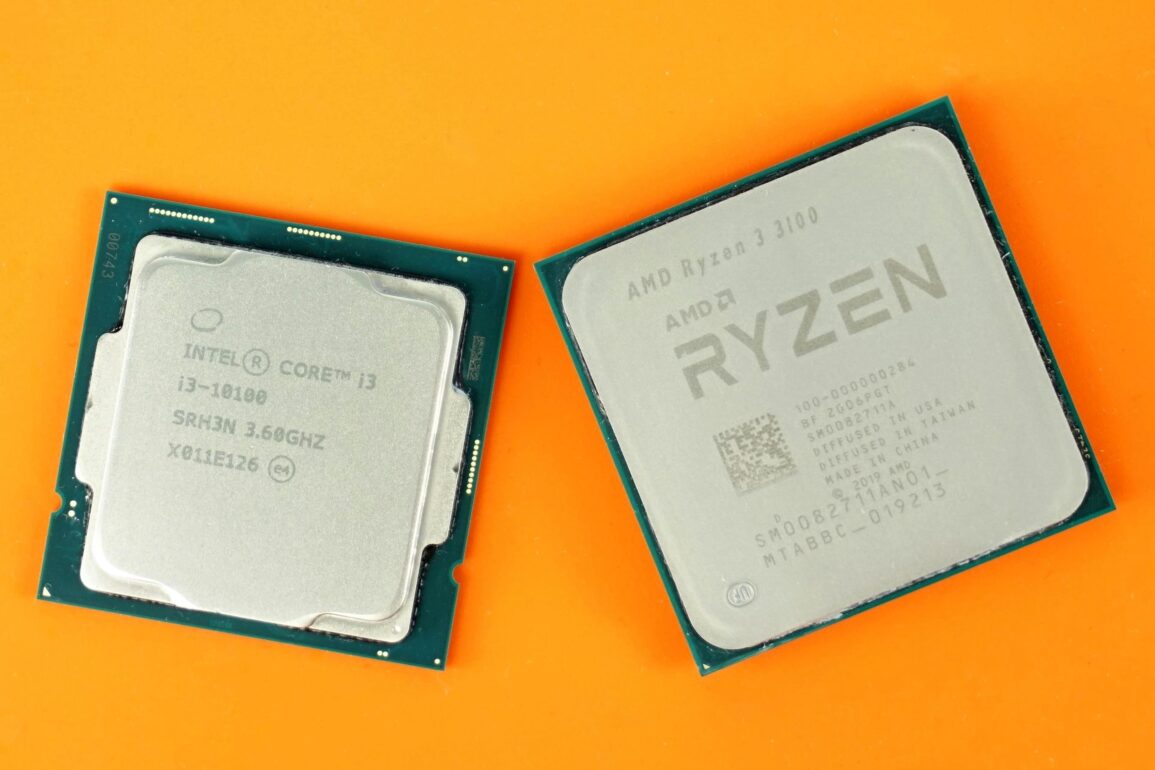Looking to build a budget-friendly PC but torn between AMD’s Ryzen 3 and Intel’s i3 processors? Look no further! In this comprehensive comparison, we break down the key differences between these two powerhouse CPUs to help you make the best choice for your next build. Whether you’re a gaming enthusiast or a multitasking pro, we’ve got all the information you need to make an informed decision. Let’s dive in and find out which processor comes out on top for your budget-friendly build!
Introduction to Ryzen 3 and i3 Processors
When it comes to building a budget-friendly PC, one of the most crucial components to consider is the processor. The market is flooded with options, but two of the most popular choices for budget builds are AMD’s Ryzen 3 and Intel’s i3 processors. Both offer impressive performance at an affordable price point, making them viable options for gamers, content creators, and everyday users alike.
Ryzen 3 Processors
AMD’s Ryzen 3 processors are part of their latest generation of CPUs, known as the Zen architecture. These processors are designed with multithreading capabilities, meaning that each core can handle multiple tasks simultaneously. This allows for better multitasking performance and improved overall speed.
One of the standout features of Ryzen 3 processors is their high core count compared to other budget CPUs in the market. For example, the Ryzen 3 3300X has four cores and eight threads while its competitor in this price range, Intel’s i3-10100 only has four cores and four threads. This gives Ryzen an edge when it comes to handling demanding applications or running multiple programs at once.
Additionally, all Ryzen 3 processors come unlocked out of the box, which means they can be overclocked for even better performance without having to spend extra money on a more expensive “K” series CPU.
i3 Processors
Intel’s i3 processors have been a mainstay in budget builds for years now. Like AMD’s Ryzen line-up, they also boast multithreading capabilities with their Hyper-Threading technology that allows each core to work on two tasks at once.
The latest generation of i3 processors belongs to Intel’s Comet Lake-S family and offers significant improvements over its predecessors in terms of both single-core and multi-core performance. They also come equipped with Intel UHD Graphics built-in graphics processing unit (GPU), making them ideal for entry-level gaming or basic graphic design work.
While the i3 processors have a lower core count compared to Ryzen 3, they make up for it with higher clock speeds. This means that they can handle single-threaded tasks more efficiently, making them suitable for everyday use and light gaming.
Conclusion
Ryzen 3 and i3 processors both offer impressive performance at an affordable price point. They are both budget-friendly options for those looking to build a PC without breaking the bank. The choice between the two ultimately comes down to personal preference and specific needs. If you prioritize multitasking and heavy workloads, then AMD’s Ryzen 3 CPUs might be the better option. However, if you primarily use your PC for daily tasks and occasional gaming, Intel’s i3 processors could be a more suitable choice.
Specifications and Features of Ryzen 3 and i3 Processors
When it comes to budget-friendly builds, the Ryzen 3 and i3 processors are two of the most popular choices among PC builders. Both offer a strong balance between price and performance, making them ideal for those looking to build a capable system without breaking the bank.
To help you decide which processor is best for your budget-friendly build, let’s take a closer look at the specifications and features of the Ryzen 3 and i3 processors.
Specifications:
The Ryzen 3 processors belong to AMD’s mainstream line of CPUs and currently have three models available: Ryzen 3 3100, Ryzen 3 3300X, and Ryzen 3 3200G. These processors feature four cores with multi-threading technology, allowing them to handle up to eight threads simultaneously. They also have base clock speeds ranging from 3.6GHz to 4.2GHz and come with an affordable price tag.
On the other hand, Intel’s i3 processors are part of their Core series and have two current generations: 10th generation (Comet Lake) and previous generation (Coffee Lake). The latest Comet Lake i3 processors include quad-core models with base clock speeds ranging from 4.1GHz to 4.8GHz. Meanwhile, Coffee Lake i3 processors come in both quad-core and hexa-core options with slightly lower base clock speeds than the Comet Lake series.
Features:
One notable feature of AMD’s Ryzen 3 processors is their support for PCIe Gen4 technology, providing faster data transfer rates compared to Intel’s PCIe Gen2 or Gen3 supported by their i3 processors. This feature will benefit users who need high-speed data transfers for tasks such as gaming or video editing.
Moreover, all current-generation Ryzen 3000 series chips come equipped with AMD’s Wraith Stealth cooler – an added bonus that helps save costs on buying a separate CPU cooler.
In terms of graphics capabilities, both Ryzen 3 and i3 processors have integrated graphics, but the Intel i3 processors tend to have slightly better performance. This may be beneficial for users who don’t plan on using a dedicated graphics card.
Both Ryzen 3 and i3 processors support overclocking, allowing users to push their CPUs beyond their stock speeds for increased performance. However, it’s worth noting that Intel’s Comet Lake series has higher overclocking potential due to its superior single-core speed.
While both the Ryzen 3 and i3 processors offer budget-friendly options for PC builds, they have slight differences in specifications and features. It ultimately comes down to your personal needs and preferences – whether you prioritize multi-threaded performance or single-core speed – when choosing between these two capable processors.
Performance Comparison: Gaming, Productivity, and Multitasking
When building a budget-friendly PC, it’s important to consider the performance of different components in various tasks. In this section, we will compare the performance of Ryzen and Intel processors in three common use cases: gaming, productivity, and multitasking.
1. Gaming Performance:
When it comes to gaming, both Ryzen and Intel have their strengths and weaknesses. In terms of raw power, Intel’s processors have been dominating the market for years. However, AMD’s Ryzen processors have caught up with their newer releases and are now offering competitive gaming performance at a lower price point.
Intel’s single-core performance is still superior to that of Ryzen chips, which makes them better suited for games that rely heavily on single-threaded tasks. This includes older games or titles that are poorly optimized for multi-threading.
On the other hand, AMD’s Ryzen processors shine when it comes to multi-core performance. They offer more cores and threads at a lower price point compared to their Intel counterparts. This makes them ideal for modern games that take advantage of multi-threading technology.
Both Ryzen and Intel can provide excellent gaming experiences depending on your specific needs and preferences. If you’re strictly looking for high frame rates in older or poorly optimized games, then an Intel processor may be the way to go. But if you want a more well-rounded processor with better multitasking abilities at a lower cost, then AMD’s Ryzen is definitely worth considering.
2. Productivity Performance:
In terms of productivity tasks such as video editing, photo editing, 3D rendering or coding – AMD’s Ryzen chips offer great value for money with their higher core counts. With more cores available to handle complex tasks simultaneously, these processors can significantly improve overall productivity compared to similarly priced Intel CPUs.
However,
Intel still has the edge when it comes to single-core performance which can make a difference in certain productivity applications that are not optimized for multi-threading.
It’s also worth noting that Intel’s processors are often preferred by professionals in certain industries due to better compatibility with industry-specific software and tools. So if you work in a specific field that relies on specialized software, it’s important to do your research before deciding between Ryzen and Intel.
3. Multitasking Performance:
In today’s fast-paced digital world, multitasking has become an essential part of our daily lives. This is where AMD’s Ryzen processors truly shine. With their higher core counts and multi-threading capabilities, these CPUs can handle multiple tasks simultaneously without breaking a sweat.
On the other hand, Intel processors may struggle when faced with heavy multitasking as they have fewer cores and threads available. This can lead to slower performance or even crashes if the system is overloaded.
Ultimately, both Ryzen and Intel have their pros and cons when it comes to multitasking abilities. But for the budget-friendly builds, Ryzen offers better value for money with its higher core counts and multi-threading capabilities.
When comparing gaming, productivity, and multitasking performance between Ryzen and Intel processors – it ultimately
Price Comparison: Which is More Budget-Friendly?
When it comes to building a budget-friendly PC, one of the most important factors to consider is price. After all, the whole point of building a budget-friendly system is to save money without sacrificing performance. In this section, we will compare the prices of AMD’s Ryzen processors and Intel’s i series processors to determine which one is more budget-friendly.
Firstly, let’s take a look at AMD’s Ryzen processors. The Ryzen lineup consists of three main series: Ryzen 3, Ryzen 5, and Ryzen 7. The entry-level Ryzen 3 processors start at around $100 and go up to $150 for their top-tier model. Moving up to the mid-range Ryzen 5 series, prices range from $150 for the lower-end models to around $300 for their highest-performing processor. We have the high-end Ryzen 7 series which starts at around $300 and goes up to $500 for their flagship processor.
On the other hand, Intel’s i series processors also have three main categories: Core i3, Core i5, and Core i7. The entry-level Core i3 models are priced between $100-$150 while mid-range Core i5 models range from $200-$350. As for the high-end Core i7 processors, prices can range from $300 all the way up to over $1000 depending on the specific model.
From this initial comparison, it seems that Intel’s pricing is slightly higher than AMD’s across all categories. However, when looking at individual models within each category that offer similar performance levels, there isn’t a significant difference in price between both brands.
So which one should you choose?
It ultimately depends on your budget and what kind of build you are aiming for. If you are on a tight budget but still want decent performance in tasks like gaming or video editing, then AMD’s Ryzen series might be your best bet as they offer great value for the price. On the other hand, if budget is not a major concern and you want the best performance possible, then Intel’s i series processors may be a better option.
It’s also worth noting that AMD’s Ryzen processors are known to have better multi-threaded performance compared to Intel’s i series. This means that for tasks that require multiple cores such as video editing or 3D rendering, Ryzen would provide more bang for your buck. However, when it comes to single-core performance (which is important for gaming), Intel still holds an advantage.
Both AMD and Intel offer budget-friendly options in their processor lineups. While AMD tends to have lower prices overall, it ultimately depends on your specific needs and budget when deciding which one is more budget-friendly for your build. It’s always recommended to do further research and compare individual models within each brand before making a decision.
Overclocking Potential of Ryzen 3 and i3 Processors
Overclocking has become a popular practice among PC enthusiasts, as it allows them to push their processors beyond their stock speeds for improved performance. Both the Ryzen 3 and i3 processors have shown significant overclocking potential, making them attractive options for budget-friendly builds.
Firstly, let’s discuss the Ryzen 3 processors. These processors are known for their multi-core performance and come with unlocked multipliers, which means they can be easily overclocked. The Ryzen 3 3300X and 3100 are particularly notable in this regard. With a base clock speed of 3.8GHz and boost clock speed of up to 4.3GHz, the Ryzen 3 3300X is already quite powerful. However, users have been able to achieve stable overclocks of up to 4.4GHz on all cores with proper cooling solutions in place.
Similarly, the Ryzen 3 3100 has a base clock speed of 3.6GHz and boost clock speed of up to 3.9GHz, but users have been able to reach stable overclocks of around 4.2GHz on all cores with air or liquid cooling setups. This is quite impressive considering that these processors are priced under $150.
Moving on to the Intel side, the i3 processors also offer decent overclocking potential at an affordable price point. The i3-10100 has a base clock speed of only 3.6GHz but can turbo boost up to a respectable frequency of 4.30 GHz on one core and up to four cores at a slightly lower frequency.
Achieving Stable Overclocks with Proper Cooling Solutions
With proper cooling solutions in place, users have been able to successfully achieve stable overclocks of up to around ~5Ghz on all cores with this processor – effectively doubling its original base frequency! Moreover, Intel recently released its K-series unlocked i5-i9 CPUs as well as its Z490 motherboards that support better overclocking capabilities, but they come at a significantly higher price point compared to the budget-friendly i3 processors.
In terms of overall overclocking potential, both Ryzen 3 and i3 processors offer impressive results for their respective price ranges. However, it is important to note that overclocking can put extra strain on your hardware and may void your warranty. It is crucial to have a proper cooling solution in place and follow safe practices when attempting to overclock your processor.
The Ryzen 3 and i3 processors provide great value for budget-friendly builds in terms of both stock performance and overclocking potential. It ultimately comes down to personal preference and specific use cases when choosing between these two options for your PC build. But with proper research and consideration, you can easily find the best fit for your needs.
Compatibility with Motherboards and Other Components
When building a budget-friendly PC, compatibility with various components is crucial. This includes compatibility with the motherboard, which acts as the foundation of the system. The processor is one of the most important components to consider when it comes to compatibility, and in this case, we will be comparing AMD’s Ryzen processors and Intel’s i series.
Firstly, let’s take a look at compatibility with motherboards. Both Ryzen and i series processors are compatible with different types of motherboards such as ATX, Micro-ATX, and Mini-ITX. However, AMD has an edge over Intel in terms of motherboard compatibility as their AM4 socket is supported by both entry-level and high-end motherboards from various manufacturers. On the other hand, Intel’s LGA 1200 socket only supports their 10th generation processors.
Another factor to consider is the chipset of the motherboard. In general, higher-end chipsets offer better features and overclocking capabilities but come at a higher price point. AMD offers more options for budget builds with their B450 chipset which still provides good performance for its price range. Intel’s equivalent would be their B460 chipset but it lacks support for overclocking which could be a downside for some users.
RAM and Graphics Card Compatibility
Both Ryzen and i series processors have similar compatibility levels with RAM and graphics cards, supporting DDR4 memory modules up to certain speeds (e.g., 3200MHz) depending on the motherboard’s capabilities. There are no limitations or differences in graphics card compatibility as they both utilize PCIe 3.0 technology.
Ryzen stands out in supporting faster RAM speeds compared to i series processors at similar price points. For instance, an entry-level Ryzen 3 processor can handle up to 3200MHz, while an equivalent Intel Core i3 can manage only up to 2666MHz without overclocking. This can lead to better overall system performance, particularly in gaming.
Regarding storage compatibility, both processors work with various types of storage devices such as HDDs, SSDs, and NVMe drives. Ryzen has an advantage in PCIe lanes, allowing for more NVMe drives to be connected without affecting other components’ performance. Intel provides faster boot times with their Optane memory technology, but it’s supported only by their higher-end processors.
Both Ryzen and i series processors offer good compatibility with motherboards and other components for budget-friendly builds. However, AMD has a slight edge when it comes to motherboard options and support for faster RAM speeds. It ultimately comes down to personal preference and specific needs when choosing between the two brands.
User Reviews on Ryzen 3 and i3 Processors
When it comes to choosing a processor for your budget-friendly build, one of the key factors to consider is user reviews. After all, who better to trust than those who have actually used the product? In this section, we will take a closer look at user reviews for two popular budget processors – Ryzen 3 and i3.
Firstly, let’s delve into the user reviews for Ryzen 3 processors. Users have been very impressed with the performance and value for money offered by these processors. Many users have praised the multi-threading capabilities of Ryzen 3, which allows for more efficient multitasking and smoother overall performance. This is especially beneficial for tasks such as video editing or streaming.
In terms of gaming performance, Ryzen 3 has also received positive feedback from users. Many have noted that games run smoothly and without any noticeable lag on these processors. Additionally, several users have commented on how well Ryzen 3 handles overclocking, allowing them to push their system even further without any issues.
Another factor that has stood out in user reviews is the price point of Ryzen 3 processors. Users are impressed with how much power they can get at such an affordable price compared to other options in the market. Several reviewers have mentioned that they were able to build a high-performing PC within their budget thanks to Ryzen 3.
Benefits of i3 Processors for Budget PC Builders
On the other hand, i3 processors also boast a loyal fan base among budget PC builders. Reviews suggest that i3 delivers strong single-core performance and is ideal for day-to-day computing tasks such as web browsing and document editing. Users particularly appreciate its low power consumption and quiet operation.
When it comes to gaming performance, i3 may struggle slightly compared to Ryzen 3 due to its lower core count. However, many users have still reported being able to play most modern games at decent settings without any major issues.
One area where i3 stands out is its compatibility with older hardware. Several users have mentioned that they were able to upgrade their system with an i3 processor without having to replace other components, leading to significant cost savings.
Both Ryzen 3 and i3 processors have received generally positive user reviews for their budget-friendly performance. While Ryzen 3 may offer better multi-threading capabilities and overall value for money, i3 excels in single-core tasks and compatibility with older hardware. Ultimately, the choice between these two processors will depend on your specific needs and budget constraints.
Future-proofing: Which Processor is a Better Investment
When it comes to building a budget-friendly PC, one important aspect to consider is future-proofing. This means choosing components that will not only perform well now, but also have the potential for longevity and compatibility with future software and technology advancements. In this section, we will discuss which processor – Ryzen or i – is a better investment for future-proofing your build.
Intel’s i series processors
Firstly, let’s look at Intel’s i series processors. They have been dominating the market for years and are known for their strong single-core performance. However, in recent years, AMD’s Ryzen processors have caught up and even surpassed Intel in terms of multi-core performance and value for money.
In terms of future-proofing, both Ryzen and i processors offer good options. Intel has a history of supporting its processors for longer periods of time compared to AMD. This means that an Intel processor may receive updates and support from the manufacturer for a longer period of time.
Advancements with AMD’s Zen Architecture
On the other hand, AMD has been making significant strides in recent years with their Zen architecture processors
Conclusion
Both Ryzen and i processors have their own strengths when it comes to future-proofing your build. Given current market trends and rapid technological advancements, AMD’s Ryzen processors emerge as preferable investments for budget builds. They offer better value for money, longer support lifespan, and potential for upgrades without having to change the motherboard. Ultimately, the decision between Ryzen and i will depend on your personal preferences and needs for your build.








